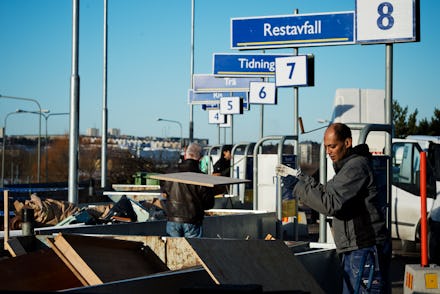Sweden is so damn good at recycling, it ran out of trash

Sweden, a nation with a long history of green leadership, gets a significant portion of its energy from burning household waste.
But a self-described "recycling revolution" has led to less than one 1% of the country's waste being landfilled, and Sweden has taken to importing garbage from other countries to keep its recycling plants going, the Independent reported.
Yes, you read that right: People are sending Sweden their garbage.
Countries like Norway and England are paying Sweden to take their trash, and Sweden is using that trash to heat their homes.
In 2015, Sweden imported about 1.5 million tons of waste. In 2020, they are projected to import 2.3 million tons, according to Al Jazeera.
"In the southern part of Europe they don't make use of the heating from the waste, it just goes out the chimney," Anna-Carin Gripwall, director of communications for the Swedish Waste Management's recycling association, told the Independent. "Here we use it as a substitute for fossil fuel."
Sweden's "recycling revolution"
More than 99% of household waste in Sweden is recycled, according to information published by the government. That's up from 38% in 1975.
A large reason for that is the country's waste-to-energy program, which is part of a larger effort to get down to zero waste by 2020.
But there is some debate as to whether or not Sweden is really the recycling master it claims to be.
In another article published by the Independent, Dr. Dominic Hogg, chairman of environmental consulting firm Eunomia, argued that incineration is not actually a form of recycling and that Sweden's real recycling rate is closer to 50% — still high, Hogg wrote, but lower than the 60% achieved in Wales.
Data published in 2015 by the Organization for Economic Co-operation and Development puts Germany at the top of the recycling pile, with recycled and composted waste making up 65% of its total municipal waste from 2013. Sweden was seventh at 50%. (The United States came in 18th at 35%.)
Noting that reliance upon incineration means reliance upon non-recyclable waste, Hogg writes that the "solution is not to keep building more and more incineration plants. On the contrary, we need to commit to a strategy based on wasting less and recycling more."
While that residual waste is not ending up in landfills, there are some environmental concerns about burning garbage, which Sweden attempts to allay by filtering the "99.9% nontoxic carbon dioxide" through dry filters and water.
Sweden also urges its residents to do even more when it comes to recycling.
"We are trying to 'move up the refuse ladder,' as we say, from burning to material recycling, by promoting recycling and working with authorities," Weine Wiqvist, CEO of the Swedish Waste Management and Recycling Association, said on the nation's recycling web site.